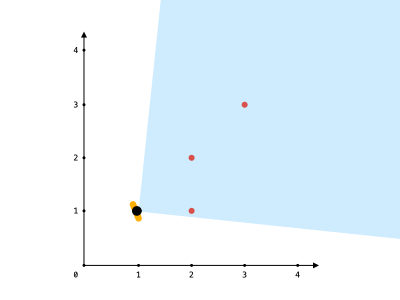1610. 可见点的最大数目
给你一个点数组 points 和一个表示角度的整数 angle ,你的位置是 location ,其中 location = [posx, posy] 且 points[i] = [xi, yi] 都表示 X-Y 平面上的整数坐标。
最开始,你面向东方进行观测。你 不能 进行移动改变位置,但可以通过 自转 调整观测角度。换句话说,posx 和 posy 不能改变。你的视野范围的角度用 angle 表示, 这决定了你观测任意方向时可以多宽。设 d 为你逆时针自转旋转的度数,那么你的视野就是角度范围 [d - angle/2, d + angle/2] 所指示的那片区域。
对于每个点,如果由该点、你的位置以及从你的位置直接向东的方向形成的角度 位于你的视野中 ,那么你就可以看到它。
同一个坐标上可以有多个点。你所在的位置也可能存在一些点,但不管你的怎么旋转,总是可以看到这些点。同时,点不会阻碍你看到其他点。
返回你能看到的点的最大数目。
示例 1:

输入:points = [[2,1],[2,2],[3,3]], angle = 90, location = [1,1]
输出:3
解释:阴影区域代表你的视野。在你的视野中,所有的点都清晰可见,尽管 [2,2] 和 [3,3]在同一条直线上,你仍然可以看到 [3,3] 。
示例 2:
输入:points = [[2,1],[2,2],[3,4],[1,1]], angle = 90, location = [1,1]
输出:4
解释:在你的视野中,所有的点都清晰可见,包括你所在位置的那个点。
示例 3:

输入:points = [[1,0],[2,1]], angle = 13, location = [1,1]
输出:1
解释:如图所示,你只能看到两点之一。
提示:
1 <= points.length <= 105
points[i].length == 2
location.length == 2
0 <= angle < 360
0 <= posx, posy, xi, yi <= 109
const double eps = 1e-8; class Solution { public: int visiblePoints(vector<vector<int>>& points, int angle, vector<int>& location) { int x = location[0]; int y = location[1]; int same = 0; vector<double> v; for (auto p : points) { int px = p[0], py = p[1]; if (px == x && py == y) same++; else v.emplace_back(atan2(px - x, py - y) * 180 / M_PI); } sort(v.begin(), v.end()); int sz = v.size(); for (int i = 0; i < sz; i++) v.emplace_back(v[i] + 360); int r = 0, mx = 0; for (int l = 0; l < sz; l++) { while (r + 1 < v.size() && v[r + 1] - v[l] <= (double)angle + eps) r++; mx = max(mx, r - l + 1); } return mx + same; } };


